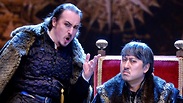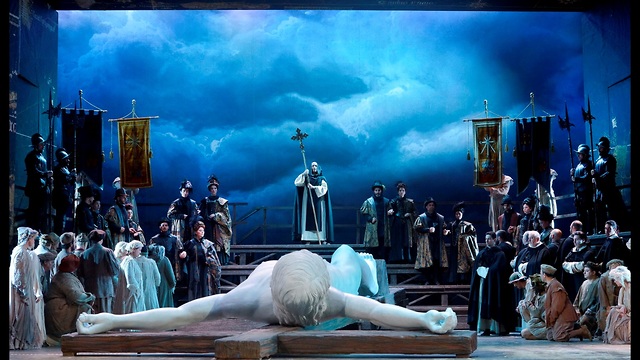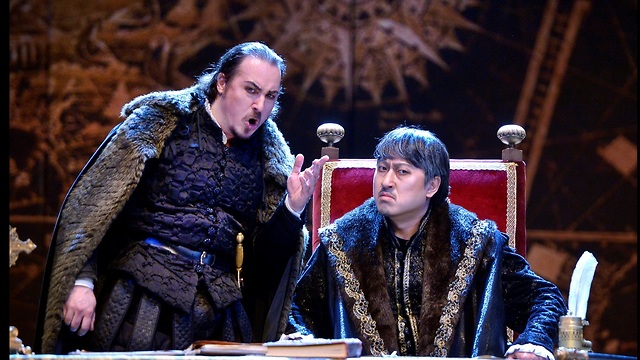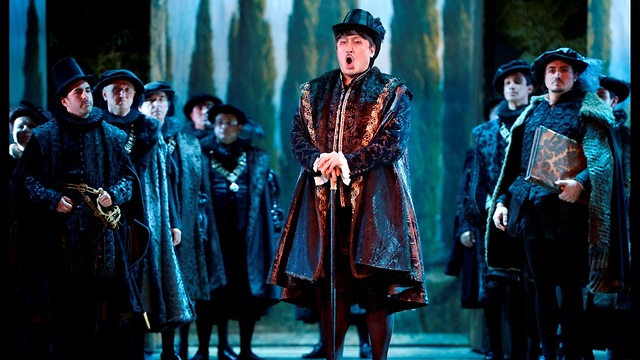
Giuseppe Verdi’s Don Carlo
Photo: Yossi Zwecker
None of Giuseppe Verdi’s operas have as many versions as Don Carlo (also known as Don Carlos, in the original French—ed). Besides being sung in two different languages, it exists in four-act and five-act versions, with and without a ballet, and with alternate beginnings and endings.
The version of Don Carlo being performed by the Israel Opera this month is one of the shorter ones in the repertoire—four acts, without the ballet sequence—and it still runs for almost four hours (with one intermission). Yet this co-production of the Asociacion Bilbaina de Amigos de la Opera, the Teatro de la Maestranza de Sevilla, the Opera Oviedo and Tenerif Opera Festival never falters; the sublime music and sweeping production values sustain the audience’s attention throughout.
This grandiose production—highlighted by scenes in which the stage is filled with costumed members of the Israel Opera Chorus, whose voices reverberate throughout the concert hall, and actors from the Academy of Performance Art—marks the return to Tel Aviv of Italian director Giancarlo del Monaco, after an absence of several seasons.
By contrast, set designer Carlo Centolavigna and costume designer Jesus Ruiz are doing their first work with the Israel Opera, and each has clearly made his mark: the former most notably in the dramatic auto-da-fé scene, whose centerpiece is a giant plaster crucifix with an ostentatious (and rather gratuitous) display of male genitalia; and the latter in the way he dressed Princess Eboli, complete with black eyepatch, as the 16th century historical figure has been depicted in contemporary artwork.
Conductor laureate of the Israel Opera orchestra Daniel Oren is back at the podium for only the second time this season, while the lead roles were sung on opening night by soloists who are also quite familiar to recent Israeli opera goers: Argentinian tenor Gustavo Porta as Don Carlo, Romanian baritone Ionut Pascu as Rodrigo, South Korean bass Simon Lim as King Filippo II, and Israeli soprano Ira Bertman as Queen Elisabetta. The only exception was Georgian mezzo-soprano Ketevan Kemoklidze, in the role of Princess Eboli, who is making her Israel Opera debut.
There are very few famous arias in Don Carlo, but the one that received the most sustained applause of the evening was Lim’s rendition of Ella giammai m'amò at the beginning of Act III. Another solo, O don fatal, sung by Kemoklidze in Act IV, came a close second.
The performance of another newcomer to the Israeli stage—Ukrainian bass Ievgen Orlov, in the role of the Grand Inquisitor—was equally impressive. Both his profundo voice and commanding demeanor were compelling.
Otherwise, the most beautiful parts of the opera were when multiple voices were involved: the duet Dio, che nell’alma infondere of Don Carlo and Rodrigo in Act I; the aria Nel giardin del bello sung by Eboli and the chorus in Act II, followed immediately by the trio of Don Carlo, Eboli and Rodrigo, which concludes with a duet by Don Carlo and Rodrigo; the quartet of the king, Eboli, Rodrigo and Elisabetta in Act III; and the full-throated chorus in the riveting auto-da-fé scene that closes Act II.
Don Carlo will run through March 23. The next production will be The Tale of Tsar Saltan, by Nikolai Rimsky-Korsakov, in May.



















